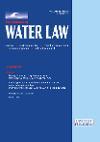Journal of Water Law - Volume 28 - Issue 5

ARTICLES
Managed retreat of agricultural water
STEPHANIE M STERN
Professor of Law, University of Arizona James E Rogers College of Law
A DAN TARLOCK
University Distinguished Professor Emeritus, Chicago-Kent College of Law, Illinois Tech
Climate change is stressing agriculture in arid regions such as the American West. This article proposes a novel application of managed retreat to ease the pain for drought-stricken small farmers and to reallocate water rights to instream flows. In the United States and other countries, managed retreat relocates households from residences in severe climate risk zones by buying the properties and dedicating them to open space. The article considers how the federal government can retreat agricultural water by buying farmland with water rights or severable water rights when available and permanently restricting water consumption. Although the article focuses on the American West, agricultural managed retreat could benefit other countries facing the negative synergies from climate change and pre-existing misallocations of agriculture and water.
Iran’s approach to transboundary watercourses under international law
JOSEPH W DELLAPENNA
Beijing University School of Transnational Law, Shenzhen, China
FARNAZ SHIRANI BIDABADI
School of Law, Central South University, Changsha, China
International (transboundary) waters often lead to international cooperation through agreements between riparian states, but they can also lead to disputes, though rarely to outright conflicts, between states. These needs and risks are especially salient now because of drought, climate disruption, contamination, lack of proper water resources management, and other factors across the planet, particularly in arid and semi-arid countries as in the Middle East. Iran, where water has always been a scarce and valuable resource, is a prime example. This article considers how Iran manages its transboundary watercourses in cooperation and in competition with its neighbours and how the current international legal frameworks could support improved cooperation. The analysis examines Iran’s transboundary water agreements with its neighbours and looks to the UN Watercourses Convention (1997) and the Berlin Rules on Water Resources (2004) as the most recent comprehensive summaries of the relevant international law to provide guidance drawn from global legal experience.
STRATEGIC ISSUES –SCOTLAND
PROFESSOR SARAH HENDRY
Dundee Law School & the UNESCO Centre for Water Law, Policy and Science, University of Dundee
NEWS
Farmer blames weather app after rain washes slurry down road
Ofwat calls on water sector to improve its performance after companies fall short on targets
